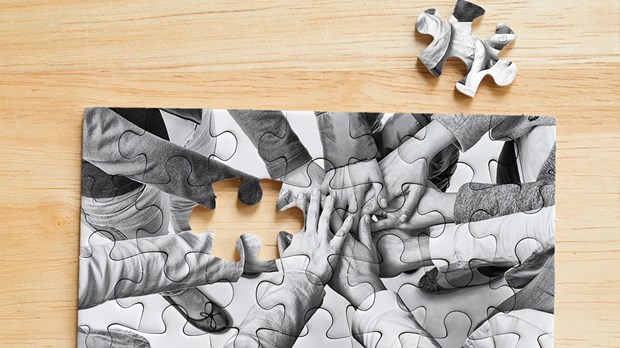
I so badly want “community.” I want a meal delivered with extended arms on bad days. I want heartfelt calls when things go wrong. I want friends to walk straight through my unlocked door as I wait with a plate of cookies. I want known faces to pull up on moving day. I want gatherings of people, smiling at the sound of loud laughs. I want both my tears and my joys to be tenderly held. I want to encourage another to astounding new heights. I want to love and be loved within a community that cares—that endures.
I don’t have that—but the idea thrills me. It thrills many of us. In fact, we crave it. We look for it. We desire it, but we often miss it altogether.
Settling for Less
Community is like a missing puzzle piece in our lives. We know it should complete a beautiful picture, but we have no idea how to find it. We understand it’s valuable and irreplaceable in the grand scheme of things, but it’s gotten lost in the shuffle. We say we want to find it, but we don’t feel like pulling out all the junk in order to recover it. Why? Because we know that community can get messy.
So, we go along our way, hoping it will some day easily turn up without much effort on our parts. We dream of the finished product—of friends, fellowship, and fun—but we resign ourselves to a partial picture, lacking both community and completion.
We settle for pseudo-community that offers a quick hello and a quick goodbye. It doesn’t have time to listen to pain. It allows a messy living room to take priority over sharing messy lives. It puts individual needs above the needs of others.
The Blame Game
This sort of pseudo-community leaves us feeling empty and unsatisfied, and when we feel community is lost, we often start blaming others.
We blame the church. Maybe we think our church doesn’t offer us good enough chances to connect, or the small groups are too big, or the space doesn’t allow for conversation.
We blame our circumstances. Perhaps our kids’ naptimes take the blame. We’ve got too much going on in our schedule. Perhaps we zero in on a particular person who annoys us.
We blame ourselves. We may think, I’ll never be able to handle talking with all these people. Or maybe we wonder, Do these people even care about me? Perhaps we focus on a sense of inadequacy, feeling like we can’t handle all that’s already on our plate.
As we cast blame, our bitterness grows; we feel lonely, discontent, and isolated. Instead of fixing the problem, blaming and shaming only seem to make it worse. In order to experience real community, we need to be willing to do something drastic: we have to look at our junk. We have to dig through the mess that is covering our missing puzzle piece.
Sorting Through Your Own Junk
Are these common “junk piles” preventing you from finding and experiencing real, life-giving community?
1. Busyness
We rush from here to there and then rush from there to here. We rush everywhere. When we are not rushing, we are texting, calling, or driving. There is no time for community when there’s no time to think about anything besides our daily agenda.
By slowing down, we can look at each item in our life to evaluate its worth, deciding whether to keep it or toss it. If it isn’t giving us the chance to love God or to love others more, we have to take a serious look at its value in our lives. We need to make more space to love others, so clearing out this rapidly accumulating pile of junk is key.
2. Laziness
We want community that moves past cordial greetings and shallow hellos to deep care and authentic transparency. But sometimes we can’t even motivate ourselves to get up off of our couch to offer a friendly hello. Television grabs us, the Internet holds us, and aching backs keep us in. We tell ourselves that we just need to relax—to chill.
Christ took time to be alone and to pray. There is a time to recuperate; however, this time is meant to replenish us with God’s love so that we can go out and love others. We shouldn’t let laziness leech away time that is better spent developing relationships rather than deepening isolation.
3. Annoyance
There is always that person. The person who laughs a little too loud, who steals the spotlight, who doesn’t talk, who aggravates, who pesters, who complains, who _________ (fill in the blank). That person is always there, and dealing with them can be like dealing with a living nightmare.
We can get aggravated when we pursue community only to feel that the piece we find doesn’t fit into our puzzle quite right. We want to toss it out and give up on chasing after the dream we always imagined. But God calls us to bear with one another (Colossians 3:13). He commands this for good reason! In seeing difficult relationships through, by persevering in the face of frustration or annoyance, God is giving us a greater gift—sanctification. Know this: when people annoy us, God will grow us. Even this taxing aspect of community can serve God’s purpose in our lives.
4. Self-Centeredness
Sometimes we’re just trying to make it through the junk in our own life. We already feel incapable of handling the problems we are dealing with, so how could we add on another person’s problems? How could we possibly handle everything we have—and someone else?
Yet Scripture urges us: “Don’t be selfish; don’t try to impress others. Be humble, thinking of others as better than yourselves. Don’t look out only for your own interests, but take an interest in others, too” (Philippians 2:3–4). It’s easy to become self-centered and to see our problems as bigger than others’. But true community develops when we choose to set aside our own concerns for a time and focus on another’s struggles—with Christ’s humility as our example. As we step out in faith to walk toward someone else in need, God will be faithful to provide all we need. When we refresh another, we are the ones who get refreshed (Proverbs 11:25).
5. Acceptance
Will others like us? Will we be accepted? Will they want to be friends with us too? Sometimes it can feel like we’re regressing right back into high school, but these are normal questions. We all want to be liked, and we’re all afraid of rejection.
Community demands that we become willing to show others the hidden parts of ourselves—our struggles, weaknesses, shortcomings. In order to experience true acceptance, we must make ourselves vulnerable to rejection.
It’s worth the risk. If we live according to our fears, we live constrained and alone. God calls us to walk by faith and not by sight, and that may mean that we have to ignore all of the warning signs telling us that this is too painful or difficult. Pushing through that fear and being willing to take down our guard is the first step in entering into a vibrant, growing community.
Grab Hold of the Missing Piece
Community may be puzzling, but it has a purpose. In community, we can build up each other and stir up each other to good works (1 Thessalonians 5:11; Hebrews 10:24–25). As we sharpen each other, we grow stronger (Proverbs 27:17). We learn to bear another’s burdens and love others as he has loved us (Galatians 6:2; John 13:34). God’s Word is clear: community is a vital link to faith.
When we come together, we are encouraged together. As we are encouraged together, we walk together. We go farther. We reach higher. We feel stronger. We have unity. We love those who need love. We come outside of our own homes to link hands with those who may need the love of Christ.
When we each look back at our lives, we will never wish that we’d spent more time being busy, relaxing, or protecting ourselves. No. We will look back and remember the moments, the people, the relationships, how we helped others, and how God used us.
So let’s clear out the junk and grab hold of that missing piece. Having that complete picture of what God wants for us—living in community—will teach us lessons about selfless love, steadfast friendship, and generous living that we may never have learned otherwise.
Kelly Balarie is a blogger, speaker, and mom of two toddlers. When she isn’t writing on her blog, Purposeful Faith, tweeting or posting on Facebook, you will find her devouring yummy food with her husband, laughing with her toddlers, or searching online for her next travel destination.
Read more articles that highlight writing by Christian women at ChristianityToday.com/Women
 Read These Next
Read These Next

 Tempted to Trash Talk Your Ex?Why it's worth it to take the high road
Tempted to Trash Talk Your Ex?Why it's worth it to take the high road
 Community Never DiesA letter to a grieving friend
Community Never DiesA letter to a grieving friend
 Intimacy Is More Important than You ThinkWhy it’s the secret to feeling better
Intimacy Is More Important than You ThinkWhy it’s the secret to feeling better








 Homepage
Homepage